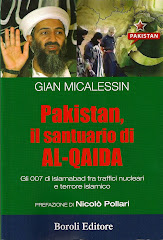In Pakistan, ex-spy Khalid Khawaja's killing is surrounded by mystery
By Karin Brulliard
Washington Post Foreign Service
Monday, May 3, 2010; A09
ISLAMABAD, PAKISTAN -- Shrouded in white, the spy's bullet-riddled body was buried Sunday, and with it clues to a cloak-and-dagger mystery gripping Pakistan.
The funeral was for Khalid Khawaja, 58, a former Pakistani intelligence agent who journeyed last month to the militant-controlled borderlands of North Waziristan, only to be killed by a little-known insurgent group that accused him of working for the CIA and its Pakistani counterpart.
That is where this whodunit becomes more of a why-done-it. Khawaja placed himself solidly in the anti-American, pro-Taliban camp. So did his traveling companion, a fellow ex-spy and U.S- trained Taliban architect with the nom de guerre Colonel Imam.
"How could the mujaheddin kill their supporter?" asked Mohammed Zahid, 45, an engineer who was among a modest crowd standing under a baking mid-morning sun at the funeral.
The answer, according to emerging clues and security analysts, is that North Waziristan, once a hub of Taliban fighters with links to Pakistan's military, has evolved into a stewpot of militant groups, each with different loyalties. Old Taliban ties may have meant little to the Asian Tigers, the group that said it killed Khawaja and is thought to be a Punjab-rooted organization battling the Pakistani state.
"Fiefdoms have been formed," said Saad Muhammad, a retired general based in the northwestern city of Peshawar. "It's an area which is almost totally out of control of the state, and even the local Taliban leaders."
Those messy alliances make it increasingly difficult to decipher who is on whose side.
Khawaja, a onetime squadron leader in Pakistan's air force who claimed ties to Osama bin Laden, was long a go-between for militants and military. Recently, he became a legal adviser to five Virginia men accused of terrorism in Pakistan; in a March interview, he said they had been framed by the U.S. government.
Still, many Pakistani militants loathed Khawaja for his role during a 2007 military siege of an Islamabad mosque, during which he allegedly set up a radical cleric's arrest by convincing him to try to escape while disguised in a burqa.
But that same cleric, Abdul Aziz, said the prayer at the funeral on Sunday, and then said in an interview that Khawaja was "a person who always fought for his religion."
Deepening the ambiguity is the involvement of Colonel Imam, whose real name is Sultan Amir Tarar and who boasts even stronger militant credentials than Khawaja. In the 1970s and 1980s, Tarar ran CIA-funded camps for fighters resisting the Soviet occupation of Afghanistan. Among his backers was the late U.S. congressman Charlie Wilson (D-Tex.) and among his charges was Mohammad Omar, who in the mid-1990s became leader of the Taliban.
Trained in guerrilla tactics at Fort Bragg, N.C., Tarar is now among the retired Pakistani intelligence agents suspected by Western officials of continuing to assist the Afghan Taliban. He denied that in a recent interview with the Times of London, but said he was "happy with the current situation because the Americans are trapped there."
Omar, he said, "is a very reasonable man."
But Omar, who still leads the Afghan Taliban, is not based in North Waziristan. That has long been the domain of the Afghan Taliban's Sirajuddin Haqqani and the Pakistani Taliban's Hafiz Gul Bahadur, both of whom have tacit peace deals with the Pakistani army. Recently, however, a military operation in neighboring South Waziristan pushed fighters who attack state forces to the north, and Punjab-based splinter factions have also set up shop in North Waziristan.
Accounts vary wildly about what Khawaja and Tarar -- who also were accompanied by a filmmaker -- intended to do in that thorny region. Gen. Mirza Aslam Beg, a former Pakistani Army chief, said at Khawaja's funeral that they wanted to make a documentary. Khawaja's son told Pakistani television that his father intended to broker a peace deal between the military and Pakistani Taliban forces that attack inside the country.
The killers, however, said Khawaja was a spy. Tarar and the filmmaker, meanwhile, remain captives.
"There was a time when you could take the name of Colonel Imam and go anywhere," a senior Pakistani intelligence official said in an interview. "That was a long time back."
With much of the case still a mystery, Pakistanis are filling in the blanks themselves. As often happens, many point fingers far beyond the Afghanistan-Pakistan border.
At the funeral, Beg said Islamist militants could not possibly be the killers. The name "Asian Tigers," he said, "smells of the south of India." At the same time, he said, the United States wants Pakistan to take on militants in North Waziristan, which gives them a motive to instigate turmoil there.
Usama Khawaja, the ex-spy's son, simply said it was "surely a conspiracy." Beyond that, he was stumped.
"My father," he said, "had many secrets in his chest."
Special correspondents Shaiq Hussain and Haq Nawaz Khan contributed to this repor
Iscriviti a:
Commenti sul post (Atom)



Nessun commento:
Posta un commento